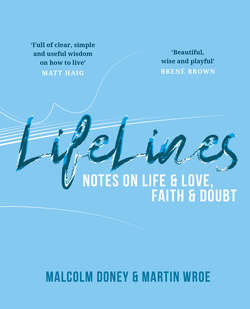Читать книгу LifeLines - Malcolm Doney - Страница 29
На сайте Литреса книга снята с продажи.
Оглавление20
Trust your instinct
On the first day in a new job, or at a new school, your antennae go into overload. Particularly when it comes to the people with whom you’ll be sharing this habitat. Every receptor you have is on alert for signals. Is she snooty or just shy? Is he genuinely friendly, or over-compensating? Why does she do that thing with her hair? Does he always sit like that? Do I like her? Can I trust him?
‘It would be interesting,’ says the essayist Malcolm Gladwell in his book Blink, ‘to find out what goes on in that moment when someone looks at you and draws all sorts of conclusions.’1 No one single sense is involved in these perceptions: it’s all of them, at the same time. We get a reading off someone in an instant. Call it gut feeling, instinct, intuition, hunch.
These readings, which we receive from people, places or situations, aren’t logical constructions. They don’t come from reasoning; they tend to arrive as a hit. But that doesn’t mean we can’t trust them. Often our instinctive decryptions are a mash up of lived experience, emotion, body language and more.
Yes, sometimes our own bad past experiences can make us fearful, or defensive, and give us false readings. And other people’s insecurities can mean they jam their own signals. So, it’s not always wise to rush to judgement. Nonetheless, our instincts are pretty reliable. And in the normal round of life, work and relationships, we can’t give one another the kind of vetting necessary for joining the security services. The singer Bono puts it like this: ‘I’ve always believed in instinct over intellect. The instinct is what you always knew; intellect is what you figure out.’2
We take a leap of faith and, Gladwell says, ‘There can be as much value in the blink of an eye as in months of rational analysis.’3
We need to be able to put our trust in our instincts and in each other, even if it’s provisional. The broadcaster Melvyn Bragg believes that faith and instinct are kissing cousins: ‘I think faith is the great undiscovered region of our minds. It’s like instinct, which I’ve always thought is compressed intelligence, at such a high speed you can’t see it, as fast as a blink.’4
Like instinct, he says, ‘faith is very often a whole perception which has to be (as it were) deconstructed into what is plausible and what is not’.5
We can lean on our instinct, faith – lay bets on it. We have to, otherwise we can’t make relationships. But we also need to interrogate it. Left unquestioned, instinct can become bigotry, phobia. But when our instincts warm us to people, to ideas, and ways of living, life unfurls. In the words of Ralph Waldo Emerson:
All our progress is an unfolding, like a vegetable bud. You have first an instinct, then an opinion, then a knowledge as the plant has root, bud, and fruit. Trust the instinct to the end, though you can render no reason.6
